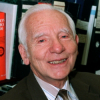Joseph Rotblat

Joseph Rotblat
Sir JosephRotblat KCMG CBE FRSwas a Polish physicist, a self-described "Pole with a British passport". Rotblat was the only physicist to leave the Manhattan Projecton the grounds of conscience. Rotblat's work on nuclear fallout was a major contribution toward the ratification of the 1963 Partial Nuclear Test Ban Treaty. A signatory of the Russell–Einstein Manifesto, he was secretary-general of the Pugwash Conferences on Science and World Affairs from their founding until 1973. He shared, with the Pugwash Conferences, the 1995...
NationalityPolish
ProfessionPhysicist
Date of Birth4 November 1908
CountryPoland
Since the end of the Cold War two main nuclear powers have begun to make big reductions in their nuclear arsenals. Each of them is dismantling about 2,000 nuclear warheads a year.
Several studies, and a number of public statements by senior military and political personalities, testify that - except for disputes between the present nuclear states - all military conflicts, as well as threats to peace, can be dealt with using conventional weapons.
Unless there is a change in the basic philosophy, we will not see a reduction of nuclear arsenals to zero for a very long time, if ever.
If the militarily most powerful - and least threatened - states need nuclear weapons for their security, how can one deny such security to countries that are truly insecure? The present nuclear policy is a recipe for proliferation. It is a policy for disaster.
Then, we were told that a world war was prevented by the existence of nuclear weapons. Now, we are told that nuclear weapons prevent all kinds of war.
Let me remind you that nuclear disarmament is not just an ardent desire of the people, as expressed in many resolutions of the United Nations. It is a legal commitment by the five official nuclear states, entered into when they signed the Non-Proliferation Treaty.
All nuclear weapon states should now recognize that this is so, and declare - in Treaty form - that they will never be the first to use nuclear weapons. This would open the way to the gradual, mutual reduction of nuclear arsenals, down to zero.
We are told that the possession of nuclear weapons - in some cases even the testing of these weapons - is essential for national security. But this argument can be made by other countries as well.
But the nuclear powers still cling tenaciously to their weapons.
The chief task was to stop the arms race before it brought utter disaster. However, after the collapse of communism and the disintegration of the Soviet Union, any rationale for having nuclear weapons disappeared.
Indeed, the very first resolution of the General Assembly of the United Nations - adopted unanimously - called for the elimination of nuclear weapons.
The present basic philosophy is nuclear deterrence.
Indeed, the whole human species is endangered, by nuclear weapons or by other means of wholesale destruction which further advances in science are likely to produce.
Alice Stewart [is] a much underestimated scientist who has been an indomitable challenger of the establishment and a thorn in the flesh of the nuclear industry.